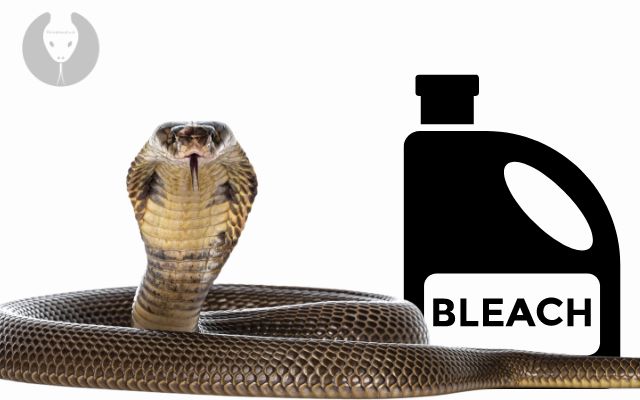Does Bleach Really Work As A Snake Repellent? If you’ve ever found yourself face-to-face with a slithering serpent, you know the feeling of unease that can come with it. But fear not, for there’s a curious remedy that has been circulating: bleach. Yes, you read that right – the same household product known for its cleaning power is being touted as a potential snake repellent. But does bleach truly possess the magical ability to keep these reptiles at bay? Let’s explore the truth behind this intriguing claim and separate fact from fiction.
What is Bleach?
Bleach, the superstar of cleaning solutions, is a magical elixir composed primarily of water and a powerful ingredient called sodium hypochlorite. This dynamic duo works together to create a potent cleaning and germ-killing agent that tackles even the toughest stains and grime. With its ability to disinfect and sanitize, bleach has become a household essential for maintaining a clean and hygienic environment.
Does Bleach Really Work As A Snake Repellent?
No, bleach is not an effective snake repellent. While the strong smell of bleach may initially deter snakes, its effectiveness as a long-term repellent is questionable. Snakes rely more on their sense of smell to detect prey and predators, rather than being repelled by certain scents. Furthermore, using bleach as a snake repellent can pose significant risks and hazards.
Does Bleach Kill Snakes?

Yes, bleach can kill snakes, but it’s not an ideal or recommended method for snake control. The strong chemical composition of bleach, which typically includes sodium hypochlorite, can be toxic to snakes if they come into direct contact with it or ingest it. When snakes are exposed to bleach, it can damage their skin, eyes, and internal organs, leading to serious harm or even death.
How long does it take for bleach to kill a snake?
When it comes to using bleach as a potential method to harm snakes, it’s important to note that intentionally exposing snakes to bleach is not a humane or recommended approach. Snakes are fascinating creatures that play an essential role in ecosystems, and it’s crucial to find alternative methods for snake management. However, if a snake happens to come into contact with bleach unintentionally, the effects can be harmful. Bleach contains chemicals that are toxic to snakes and can cause serious health issues. If a snake ingests or is exposed to a significant amount of bleach, it can lead to poisoning, organ damage, and even death.
The time it takes for bleach to harm or kill a snake depends on several factors, including the size of the snake, the concentration of bleach, and the route of exposure. Generally, if a snake consumes or absorbs a lethal dose of bleach, the effects can be fatal within a relatively short period ~ 1 hour. However, it’s important to remember that intentionally causing harm or using bleach to kill snakes is not a responsible or recommended course of action.
Potential dangers and drawbacks of using bleach as a snake repellent
Health risks associated with bleach exposure:
- Skin and respiratory irritation: Bleach is a strong chemical that can cause skin and respiratory irritation upon contact or inhalation. Prolonged or repeated exposure to bleach can lead to redness, itching, rashes, and even chemical burns.
- Toxicity: Bleach contains chemicals like sodium hypochlorite, which can be toxic if ingested. If snakes come into contact with bleach and accidentally ingest it, it can lead to severe health consequences or even death for the snakes. However, it’s important to note that using bleach to intentionally harm snakes is not recommended and may be illegal in some areas.
- Harm to humans and pets: While bleach may deter snakes to some extent, it also poses risks to humans and pets. The strong fumes of bleach can be irritating to the respiratory system, especially for individuals with respiratory conditions. Ingesting or accidentally coming into contact with bleach can cause gastrointestinal discomfort and poisoning in pets and children.
Environmental impact of using bleach outdoors:
- Soil and plant damage: Bleach is a potent chemical that can harm the soil and plants in your outdoor spaces. It can disrupt the natural balance of the soil, affecting its fertility and the health of plants. Pouring bleach on the ground or using it near vegetation can lead to wilting, yellowing, or even death of plants.
- Water contamination: When bleach is used outdoors, it can seep into the ground and potentially contaminate water sources such as wells, streams, or groundwater. This contamination can be harmful to aquatic life and other organisms that depend on clean water.
- Impact on beneficial insects: Bleach is not selective in its action and can harm beneficial insects such as bees, butterflies, and other pollinators. These insects play a vital role in maintaining ecological balance and supporting plant growth. Using bleach as a snake repellent can inadvertently harm these important creatures.
So, What chemical kills snakes instantly?
When it comes to dealing with snakes, it’s important to prioritize humane and responsible approaches rather than seeking chemicals that can instantly kill them. Killing snakes instantly with chemicals is not recommended and may even be illegal in many areas. However, there are certain chemical substances that can be used as snake repellents or deterrents. These substances work by creating an unfavorable environment for snakes, encouraging them to seek other habitats. It’s crucial to remember that the goal should be to peacefully coexist with snakes and ensure the safety of both humans and these fascinating reptiles. Instead of focusing on chemicals that kill snakes instantly, let’s explore some effective snake deterrents that can help manage snake encounters in a responsible manner:
- Natural repellents
- Sulfur
- Physical barriers
- Professional assistance
Remember, the aim should be to coexist with snakes while ensuring the safety of yourself, your family, and the snakes themselves. Understanding snake behavior, implementing preventive measures, and seeking professional advice when necessary will help you navigate snake encounters in a responsible and humane way.
FAQs
What is the number one snake repellent?
The number one snake repellent varies depending on individual preferences and effectiveness may vary based on factors such as snake species and environmental conditions. However, some commonly recommended snake repellents include natural substances like sulfur, cinnamon oil, and clove oil, as well as commercial products containing ingredients like naphthalene or sulfur. It’s important to note that while these repellents may help deter snakes, there is no foolproof method for keeping snakes away.
Does Irish Spring soap keep snakes away?
While some people claim that Irish Spring soap can repel snakes, there is no scientific evidence to support this notion. The strong scent of Irish Spring soap may have a temporary effect on deterring snakes, but it is unlikely to provide long-term or reliable protection against them.
Does Pine Sol keep snakes away?
Mothballs have long been believed to repel snakes due to their strong odor, but their effectiveness as a snake repellent is questionable. While some people claim success in using mothballs to deter snakes, there is limited scientific evidence to support this claim. Mothballs contain a chemical called naphthalene, which can be toxic to snakes when ingested in large quantities.
Conclusion
In conclusion, while bleach may have the potential to repel snakes and even cause harm or death to them, using it as a snake repellent is not a practical or safe approach. The health risks associated with bleach exposure, including harm to yourself, your pets, and your children, outweigh any potential benefits of using bleach as a snake deterrent.
Additionally, the environmental impact of using bleach outdoors can have long-lasting consequences for soil, plants, and wildlife. Instead, it is recommended to explore alternative, humane, and environmentally friendly methods for snake control.
For more in-depth information and expert advice on dealing with venomous snakes and effective snake repellents, I encourage you to read more on the VenomousSnakes blog. Stay informed, stay safe, and let’s protect both ourselves and the fascinating creatures that share our world.






